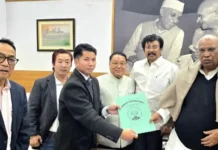KOLKATA, 12 Apr: Researchers of the Zoological Survey of India (ZSI) and Museum A Koenig in Germany have discovered six new beetle species in Northeast India, an official statement said.
A study published in the journal Zootaxa has announced the discovery of six new species of Sericinae beetles from the biodiversity-rich regions of Northeast India, it said.
The research team, comprising Devanshu Gupta, Debika Bhunia and Kailash Chandra from ZSI and Dirk Ahrens from the Museum A Koenig, meticulously examined beetle specimens housed in the Coleoptera Section of the Zoological Survey of India, Kolkata and Museum A Koenig, Germany.
“Their comprehensive analysis not only revealed these six previously unknown species belonging to the genera Maladera, Neoserica and Serica but also documented new regional records for 28 other species, significantly enhancing our understanding of the area’s rich insect fauna,” the statement said.
The newly identified beetle species are Maladera champhaiensis, Neoserica churachandpurensis, Maladera barasingha, Maladera lumlaensis, Serica subansiriensis and Maladera onam.
ZSI Director Dhriti Banerjee said, “This research highlights the critical role of international cooperation in advancing scientific knowledge and conservation outcomes and the need for ongoing exploration and documentation of insect biodiversity, particularly in under-sampled regions.”
Banerjee further emphasised, “This research underscores the importance of taxonomic studies and international collaborations in biodiversity conservation.”
By accurately identifying and documenting species, scientists provide essential data for conservation planning and management.
“We call for increased sampling efforts, particularly in Northeast India, to further enhance our understanding of regional biodiversity and to inform strategies for its protection,” the ZSI statement said.
Banerjee said preserving the biodiversity of these regions supports ecotourism initiatives, creating economic opportunities for local communities and fostering environmental stewardship. (PTI)



